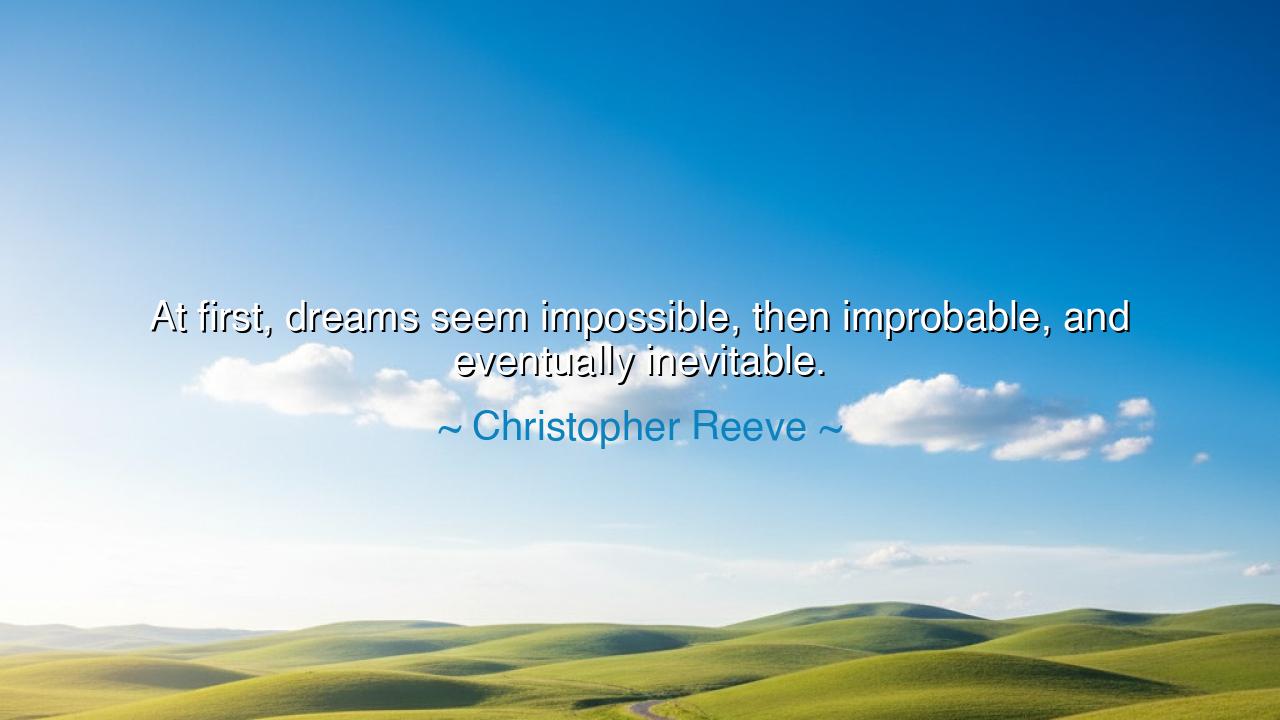
At first, dreams seem impossible, then improbable, and eventually






“At first, dreams seem impossible, then improbable, and eventually inevitable.” Thus spoke Christopher Reeve, the man who once soared as Superman in fiction and later rose as a hero in truth. These words are not the boast of one who triumphed easily, but the revelation of one who fought despair and conquered it. They are the song of the human spirit that refuses to be broken, the eternal rhythm of hope that begins in darkness and ascends toward light. For every great vision is born fragile—mocked by reason, resisted by fear—but when fed by perseverance, it ripens into destiny.
Reeve uttered these words not from the heights of fame, but from the depths of struggle. Paralyzed from the neck down after a tragic fall, he faced what seemed the end of everything—his freedom, his purpose, his life as he knew it. Yet from his still body arose a mightier movement of the soul. He became a voice for courage, for research, for hope. He turned his impossible dream—to live with purpose despite paralysis—into an inevitable triumph of will. In his silence, he taught the world that true strength is not in the muscles, but in the spirit that will not yield.
So it has always been. The prophets, inventors, and warriors of old each walked this same sacred path. Galileo, who gazed upon the heavens and saw truth where others saw heresy, was condemned by men who could not yet see the inevitable. His dream of a universe governed by law, not superstition, seemed impossible to the fearful minds of his age. Yet time, the patient servant of truth, crowned his vision. What once was mocked as madness became the foundation of modern science. Thus, the words of Reeve echo through history: what is impossible today becomes inevitable tomorrow for those who persist.
Dreams are not gifts—they are tests. They arrive like fragile seeds, easily crushed by doubt, but destined for greatness if tended by faith. The first stage is impossibility, where fear rules and the mind whispers, “It cannot be done.” The second is improbability, when small victories arise, yet obstacles still tower. And the last is inevitability, when the world itself bends to the will of those who refused to surrender. This is the law of creation, the path by which all progress is born—from the building of cities to the healing of hearts.
The ancients understood this rhythm well. They built their pyramids, temples, and philosophies upon the back of vision. The builders of cathedrals who carved stone for generations without seeing the final spire believed that someday the impossible structure would touch heaven. Their hands moved with faith that what they could not finish, another would. Such is the way of all noble dreams—they are larger than one life, but they begin with one heart that dares to believe.
Reeve’s words remind us that impossibility is an illusion. The universe itself was once nothing—a void, a silence—and yet from it came stars, oceans, and minds that can dream of both. To say that something cannot be done is to forget the history of human spirit, which has risen again and again from the ruins of despair. There is no miracle greater than persistence—no power more divine than a soul that keeps striving when reason says “enough.”
Therefore, O seeker of purpose, when your vision trembles before the mockery of the world, remember this truth: the dream that feels impossible today is already taking root beneath the soil of time. Nurture it. Guard it. Labor for it, even when no one sees. For every impossible thing that was ever achieved began as a whisper in the dark, believed by only one. Let your faith endure until the world catches up to your vision. Then, like Christopher Reeve, you too will stand as proof that what once seemed impossible can become not only probable, but gloriously, unshakably inevitable.






AAdministratorAdministrator
Welcome, honored guests. Please leave a comment, we will respond soon